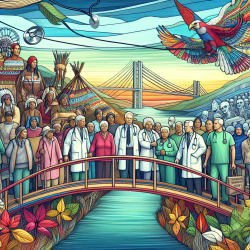The healthcare landscape for Native American elders is fraught with challenges, from limited insurance coverage to navigating complex systems. A recent study titled "Improving Native American elder access to and use of health care through effective health system navigation" sheds light on these issues and offers a roadmap for practitioners seeking to improve their skills and make a tangible difference in this underserved community.
Understanding the Challenges
Native American elders face significant disparities in healthcare access and outcomes. Historically, this population is more likely to be uninsured and suffer from poorer health outcomes compared to other aging populations in the United States. Despite reforms like the 2010 Patient Protection and Affordable Care Act (ACA), gaps remain, leaving elders vulnerable to unmet healthcare needs.
The study highlights that many elders must navigate a complex healthcare system with varying levels of health literacy. This complexity is compounded by cultural barriers and geographic isolation, particularly for those living on reservations.
A Community-Driven Approach
The research employs a mixed-methods, participatory design involving qualitative and quantitative interviews with Native American elders and key stakeholders. This approach ensures that interventions are grounded in the actual experiences and perspectives of the community.
- Qualitative Insights: Interviews reveal the social, cultural, organizational, and systemic factors influencing healthcare access.
- Quantitative Data: Surveys provide a broader understanding of health status, insurance coverage, and service utilization among elders.
Culturally Tailored Interventions
The study's findings inform the development of culturally tailored interventions aimed at improving healthcare navigation for Native American elders. These include:
- The Seasons of Care American Indian Elder Outreach and Navigation Guide (AIEONG): A mobile application designed to assist outreach workers in providing accurate information about insurance options and healthcare services.
- AIE Navigators: Specially trained individuals who act as cultural brokers between elders and healthcare systems.
The Role of Practitioners
Practitioners can play a pivotal role in implementing these interventions by:
- Cultivating Cultural Competence: Understanding the unique cultural contexts of Native American communities to provide respectful and relevant care.
- Navigating Insurance Complexities: Assisting elders in understanding their insurance options and advocating for their needs within the healthcare system.
- Pursuing Continuous Learning: Engaging with ongoing research and training opportunities to stay informed about best practices in elder care.
A Call to Action
This research underscores the importance of involving Native American communities in designing interventions that address their specific needs. Practitioners are encouraged to delve deeper into this study to enhance their understanding and contribute to reducing healthcare disparities among Native American elders.










